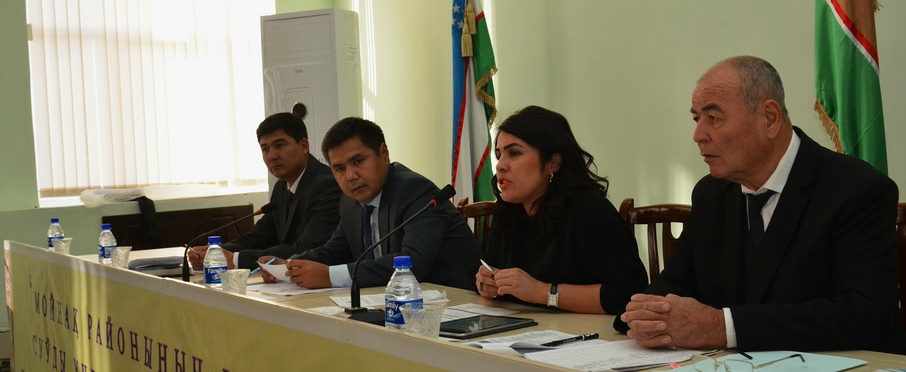Benefits of the regional cooperation – the second day of CAIEF 2017
June 6, 2017, the second day of the Central Asian International Environmental Forum ended. During the day participants examined in detail the regional agenda in the field of climate change, issues of inter-sectoral development and water cooperation.
Briefly about the discussions of the second day:
- Sharp population growth in the countries of Central Asia, which exceeds world rates – over the past 40 years, the population of the region has increased 3.5 times.
- Central Asia is one of the most vulnerable regions to climate change.
- It is more effective to consider issues of climate change and water management more interdisciplinary and intersectoral.

_____________
During the second day, presentations were made by representatives of the United Nations Environment Program, the World Bank, the United Nations Development Program, the Economic Commission for Europe, the Transboundary Water Management in Central Asia, the German Society for International Cooperation, CAREC, the Stockholm International Water Institute. Representatives from every country in Central Asia also made presentations on national policies on climate change and water management.
Among the main challenges for water management in the region contradictions between the irrigation regime of water use by the downstream countries and the energy use of rivers by the upstream countries, and the lack of a unified transparent data exchange system were mentioned. Therefore, as solutions, it was proposed to develop a realistic long-term strategy for environmentally sustainable development, taking into account economic interests of all participating countries, increasing the awareness of countries to accede to international conventions possibly as a regional package of agreements on transboundary waters that take into account principles of water distribution and balance between water and energy regimes of water use.
In these conditions, CAREC plays an important role working with the countries of Central Asia as partners, encouraging a comprehensive concept of cooperation and undertaking efforts to resolve extremely complex and sensitive regional problems.

Kazakhstan
Kazakhstan stands for the comprehensive study and application of international experience and international water law. The country applies the basin approach as one of the main principles of integrated water resources management but recognizes the need to improve the water infrastructure. In addition, Professor Ibatullin, Director of the International Training Center for Dam Safety, expressed his opinion that Afghanistan's absence in the regional organizations of IFAS is one of the challenges for rational regional water management.
Kyrgyzstan
Kyrgyzstan notes that hydropower is one of the most important economic sectors in the country, where water resources are the basis of development. The country proposes to develop economic mechanisms for water use among all countries of the region in order to avoid risks associated with unbalanced water resources management. However, such mechanisms should reflect the interests of all Central Asian countries in various sectors of the economy, and at the same time take into account regional arrangements for cross-border cooperation. As a good example of cross-border cooperation, cross-border cooperation between Kyrgyzstan and Kazakhstan on the river Chu-Talass was noted.
Tajikistan
In Tajikistan, the water sector is at the stage of reforming with the transition to integrated water resources management. At the same time, climate change is already felt in the region - anomalous weather phenomena are increasingly being observed. The country expresses its full readiness for dialogue and cooperation on the basis of such fundamental principles as mutually beneficial cooperation, good-neighborly relations, conscientious fulfillment of the obligations of international agreements.
Turkmenistan
The country noted that all rivers in Turkmenistan are of a transboundary nature, therefore the country recognizes the importance of regional institutions in coordinating and planning actions on water resources management issues. In addition, the chairmanship of Turkmenistan in the Executive Committee of IFAS will give a new impetus to regional cooperation on water management issues.
Uzbekistan
Uzbekistan is continuously engaged in consistent work to ensure water security; the system of water resources management is being improved. There is implementation of modern water-saving technologies, systems of automated control and water distribution management in the country. Measures are also being taken to improve the technical condition of water management facilities and ameliorative state of irrigated lands. Uzbekistan recognizes that water issues are of a transboundary nature and their solution requires coordinated actions of all countries of the region. Thus, in the Joint Statement by the Presidents of Uzbekistan and Turkmenistan, it is specially emphasized that the construction of new hydraulic structures on the transboundary rivers of the region should be carried out on the basis of a constructive approach and a compromise in which the interests of other interested states are not infringed.
_____________
All Central Asian countries noted and recognized the region's vulnerability to climate change affecting energy and food security. Taking into account the predicted consequences of climate change, water, food and energy security are in the high-risk zone.
Currently, the issues of climate change in CAREC are considered through three main directions. There is a separate program in the organization that plans, develops and implements targeted projects and activities on climate change and sustainable energy at the regional level on quite diverse topics: adaptation, climate stability, low-carbon development, interconnection with the principles of the green economy.
The multifaceted nature of the problems associated with climate change and water resources calls for an integrated approach to address them – taking into account interdisciplinarity and intersectoral cooperation. An interdisciplinary approach is based on the interrelationship between water, energy, food and ecosystems. Intersectoral cooperation envisages involving all stakeholders at the regional, national and local levels.
Despite the efforts made and significant progress, the solution of problems related to climate change and water resources in Central Asia requires international financial and technical assistance.
The countries of Central Asia and international partners recognize that regional cooperation on water and climate issues is an important condition for sustainable socio-economic development of the region and call for regular multilateral dialogue.
_____________
Follow the news on the forum site, where you can also subscribe to our updates. Do not forget to follow the news on our website and on the official Facebook and Twitter pages using hashtags #CAREC #CAIEF.
